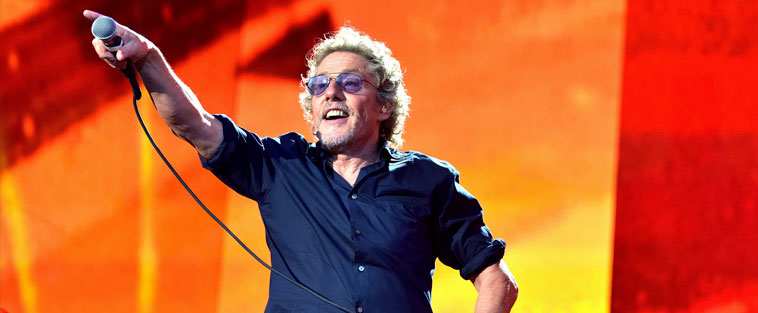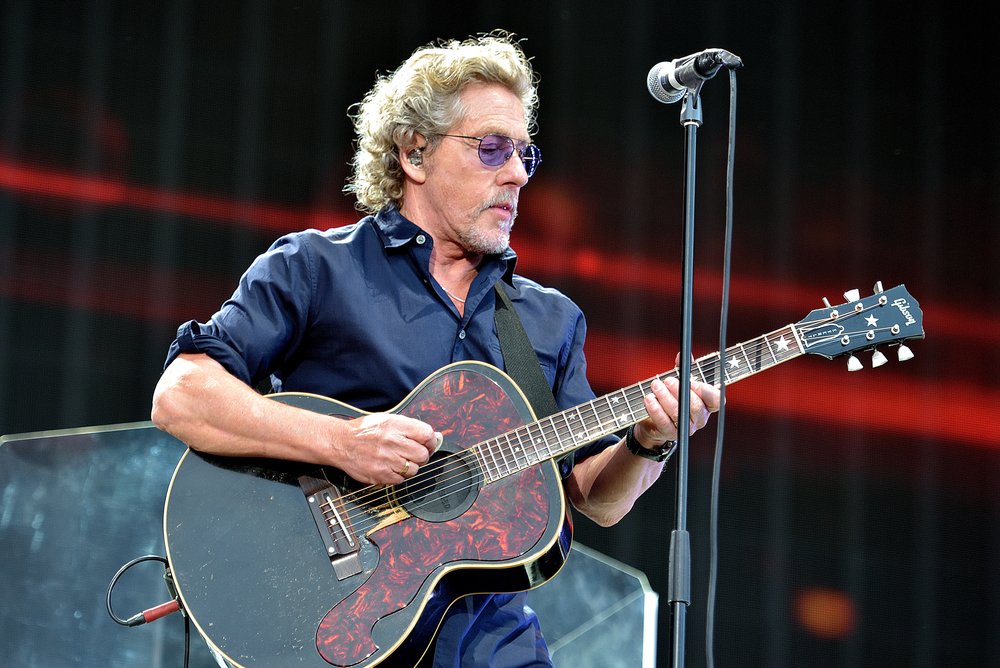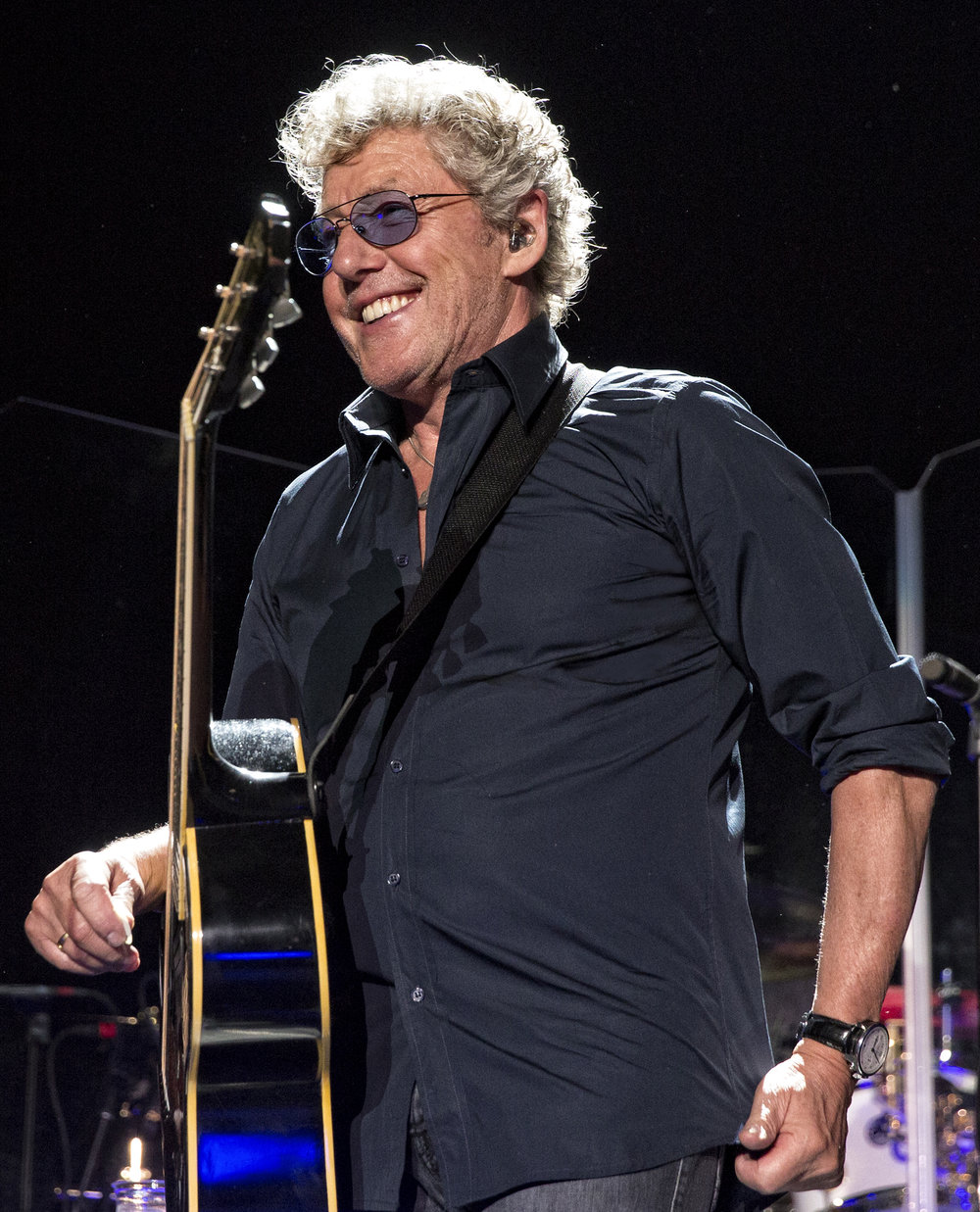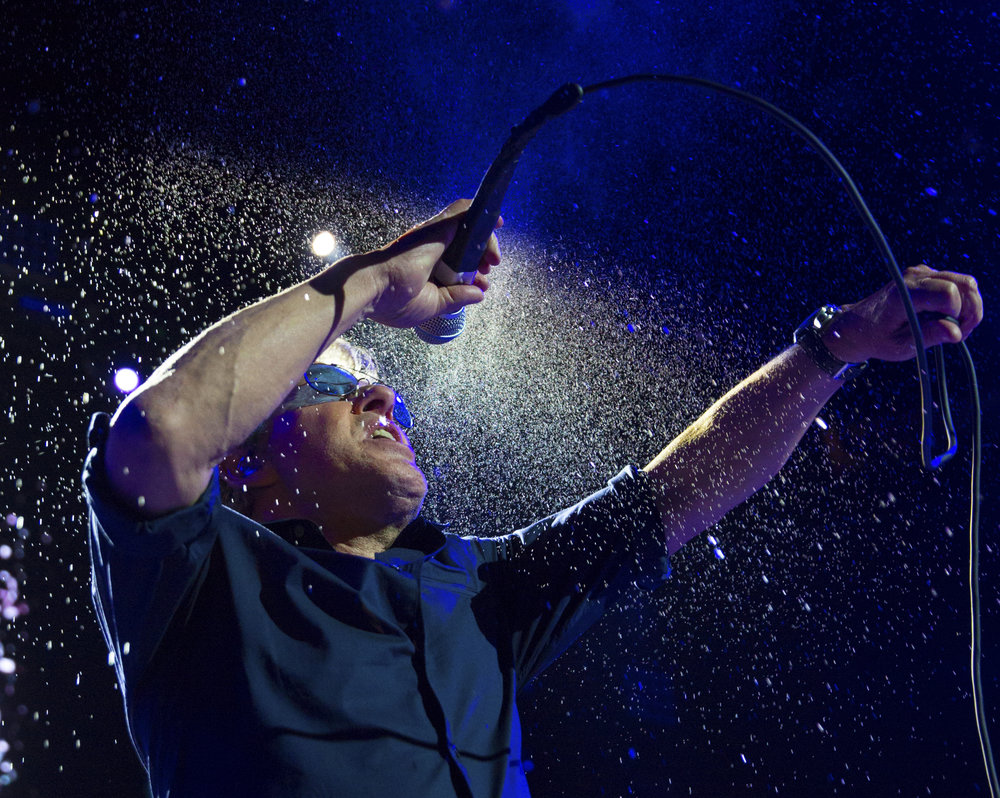
By James Turano
Verdi’s La traviata—Puccini’s La bohème—Mozart’s The Magic Flute—
Bizet’s Carmen—Rossini’s The Barber of Seville—Townshend’s Tommy. Wait … what? Pete Townshend? As in The Who’s Pete Townshend?
The guy who used to smash his guitar? He and The Who’s Tommy belong on this list of some of the greatest composers and operas of all time? Yes. Roger Daltrey made it so.
Roger Daltrey proves Pete Townshend’s place among opera’s elite—true to form, Tommy tells its story entirely through music—plus the lasting power and drama of Tommy as a revolutionary rock and roll masterpiece during a 10-city tour this summer that stops for two multi-dimensional concerts at Ravinia on June 23 and 25. And seeing and feeling Daltrey revisit this seminal rock fantasia truly is a rare treat.
Daltrey’s dynamic Ravinia-debut program features Townshend’s turbulent tale of the traumatized Tommy, who witnesses the murder of his mother’s lover at the hands of his presumed-dead father upon his return from World War I. The visceral event transforms Tommy into a mentally shuttered, deaf, dumb, and blind kid (who sure plays a mean pinball).
Musically, the concert features members of the present touring incarnation of The Who, also backed by lush scoring from the Ravinia Festival Orchestra with conductor Keith Levenson, a longtime Daltrey concert collaborator. But at its core is the work’s ultimate interpreter, the microphone-swinging singer with the muscular, earth-moving voice who effortlessly embodied and breathed life into Tommy the rock opera and Tommy the character.
◊ ◊ ◊ ◊ ◊
When we played it live, it changed me completely. I grabbed it by the scruff of the neck and said, ‘Right, let’s make this person live,’ ” Daltrey explained in the documentary Sensation: The Story of The Who’s ‘Tommy.’

Turning 50 next year, Tommy has taken on many incarnations. In addition to its original 24-song, double-album format released in May 1969, it was staged in 1972 by the London Symphony Orchestra, starring additional rock luminaries like Rod Stewart, Steve Winwood, and Ringo Starr. In 1975, it became a star-studded, extravagant Ken Russell–directed film with Daltrey fully at the center and also starring Elton John, Tina Turner, Eric Clapton, Ann-Margaret, and a warbling Jack Nicholson. In 1992, Townshend and director Des McAnuff adapted Tommy into a darker, explosive stage musical that went to Broadway and won five Tony Awards. [Actor Michael Cerveris made his Broadway debut in the title role; 10 years later, just before winning his first Tony for Assassins, he starred in Ravinia’s production of Sondheim’s Passion and returned for Sunday in the Park with George and Anyone Can Whistle the following to years.] And in 2017 The Who gave a rare full performance for the Teenage Cancer Trust charity at London’s Royal Albert Hall.
When The Who released Tommy and soon after performed it at the Woodstock music festival, the band played right into a watershed moment. It was hoisted from an artsy, rugged pop group into respected rock royalty thanks to its “serious” musical approach, brash ambition, and rousing numbers like “Pinball Wizard,” “We’re Not Gonna Take It,” “Amazing Journey,” “The Acid Queen,” and “I’m Free.”
The Who was following the uncorked creativity birthed two years earlier by The Beatles. With Sgt. Pepper’s Lonely Hearts Club Band—which coincidentally will receive its own complete performance at Ravinia two weeks after Tommy, on July 7, by Classic Albums Live—the Fab Four forever elevated rock from a fledgling, three-chord, teenage musical fad to a dominating form that changed popular music, ignited a counterculture, and craved legitimacy.
Tommy was a similarly dumbfounding leap forward, taking the aspiration of Sgt. Pepper and heightening it. Townshend invested his own self-revelations, life questions, and raw audacity into his lyrics, and The Who harnessed the innate power of their instruments. “There’s something about the mathematics of Who music. Four incredibly different characters playing completely individually, but there was something … within it that knitted it together … it had an incredible strength,” Daltrey offered.
During the album’s recording process, Townshend initially planned to sing the work’s aching refrain, “See me, feel me.” However, that immediately changed after he came to the studio one day and heard Daltrey’s pleading interpretation. He realized that Roger had occupied Tommy in such a way that other people weren’t able to occupy him. “I think everyone has a longing in them. To be understood. To be loved. And that’s what I tried to do,” Daltrey said.
The Who pulled off no simple feat with Tommy, unsuspectingly accelerating rock’s maturity. Kit Lambert, the band’s then-manager (who grew up in a musical family—his father was British composer Constant Lambert) and the album’s producer, urged Townshend to challenge his talents, reconstruct The Who’s sound, and obliterate rock’s boundaries. Lambert steered Townshend toward invigorating what he believed was a languishing operatic landscape. “Pete obviously wrote the songs, but there was huge, huge input from Kit Lambert. Kit was always pushing Pete—to write deeper, to write for a bigger stage,” Daltrey emphasized.

Townshend’s songwriting brazenly explored new, complex musical signatures and sounds for rock, coupling them with a multi-layered narrative rooted in a psychological and spiritual searching, his own childhood upheaval, and the introspective teachings of Indian mystic, Meher Baba. What Tommy lacks in story cohesiveness, it makes up for in its sense of personal discovery and liberation, and a collection of classic characters like the muted Tommy, the dethroned Pinball Wizard, the healing Acid Queen, the bullying Cousin Kevin, the obsessed Sally Simpson, and the depraved Uncle Ernie. They each navigate a series of twisted travails, swirling emotions, embattled circumstances, cathartic consequences, soaring sentimentalities, crashing failures, and temporary triumphs.
These are, of course, all required components of a worthy, legendary opera. Tommy is just … louder. And packed with more aggression, rebellion, and electricity.
In other words, a “rock opera.”
Tommy was the first to use this new designation, even though other rock acts previously flirted with classically inspired passages and musical suites. Even Townshend toyed with the fusion in 1966, composing the “operetta” medley “A Quick One, While He’s Away” for The Kids Are Alright.
◊ ◊ ◊ ◊ ◊
The power and popularity of Tommy and the intriguing concept of rock opera influenced other composers of the time, including one of the greatest classical minds. Townshend recalled that when Leonard Bernstein saw The Who perform Tommy in 1970, he excitedly exclaimed to the 25-year-old rocker, “Do you realize what you’ve done?!”
Soon afterward, in 1971, Bernstein premiered his own epic-proportioned, innovative, rock-infused work, Mass. Commissioned by Jacqueline Kennedy Onassis, Bernstein’s Mass was part of the opening ceremonies of the theater bearing her late husband’s name, the John F. Kennedy Center for the Performing Arts in Washington, DC. Mass is a sweeping, challenging musical theater piece of more than 30 movements, based on the Roman Catholic mass, but through its lead characters—the Celebrant, the choirs, and the altar servers—raises controversial and cutting questions of God, faith, redemption, and eternal salvation. The Chicago Symphony Orchestra, with Bernstein protégée Marin Alsop conducting the force of hundreds of musicians that includes Paulo Szot as the Celebrant, the Highland Park High School Marching Band, the choruses Vocality and Chicago Children’s Choir, and almost two dozen more vocalists, will perform Mass at Ravinia on July 28.
Bernstein’s bold score is written for a large classical orchestra and choir, but it its original form, he also introduced non-traditional sights and rock-related components—the “Street Chorus” ensemble played various instruments such as electric and acoustic guitars, drum sets, steel drums and bongos, synthesizers, and tambourines not in the pit, but onstage. Bernstein also reached into the rock world for a little composing assistance, beckoning Paul Simon, four lines of whose appear in “Half of the People.” More substantial contributions came from Stephen Schwartz, whose own controversial rock musical Godspell opened off Broadway just months earlier. Though not considered a rock opera in the conventional sense, Bernstein’s Mass is an embracing effort by a prestigious composer seeking to expand his own reach and channeling rock’s intrinsic energy into a classical composition, as he had also done so often with jazz
Tommy also may lay claim as an impetus for another landmark piece of rock and theatricality. In 1970, Andrew Lloyd Webber and Tim Rice collaborated with Biblical bravado and bombast to create Jesus Christ Superstar. The original double album’s 23 songs and overall sound leaned heavily on the classically flavored British “progressive rock” style of the time. Rice’s lyrics are hopeful, raging, and ethereal, and Webber’s music emotes with shades of Puccini. The raucous rock opera resurrects the story of Jesus’s latter life, as his peace-filled preaching transforms to sacrifice and crucifixion. Told from Judas Iscariot’s perspective, the piece immediately ascends on the magnificently majestic orchestral overture and continues to compel with songs like “I Don’t Know How to Love Him,” “What’s the Buzz / Strange Thing Mystifying,” “Everything’s Alright,” and the roof-raising “Superstar.” One month after the premiere of Mass, it rose to the Broadway stage and earned five Tony Award nominations.
For almost 50 years, Jesus Christ Superstar has proven as enduring as Tommy with countless theatrical revivals, plus an expansive 1973 movie version starring Ted Neeley in the title role. Most recently, on Easter Sunday, the NBC television network presented a live, highly rated production starring John Legend and Sara Bareilles. And in April, Chicago’s Lyric Opera imported the stylishly reimagined, critically acclaimed, and 2017 Olivier Award–winning London production of the musical by Timothy Sheader.
Perhaps a sign of their origin, though all these early rock operas centered on religious doctrine, they questioned rather than exalted: Tommy is a sense-deprived pinball player turned accidental messiah; Bernstein’s Celebrant temporarily refutes his foundations of faith; and Jesus Christ is recast as a hippie savior “superstar.” Other groundbreaking, rock-themed musicals of the era, like Godspell and Hair, also flowed with youthful expression, flower-power spirituality, and anti-establishment manifestos.

Reflecting on Tommy almost five decades later, Daltrey shared his thoughts about some of the album’s most revered songs: “ ‘Amazing Journey’ was the nucleus as far as I was concerned. It sticks in my brain as being the song about going through life in this strange, other world.” He also cited his affinity for “Eyesight to the Blind,” a song originally written and recorded by blues great Sonny Boy Williamson in 1951 and adapted by Townshend for Tommy. “I like singing this probably most, out of all the things we’ve ever done. It’s incredibly challenging, but at the end of it, it’s incredibly rewarding. You always come off feeling emotionally good,” Daltrey said. But upon hearing Townshend’s original demo version of the eventual classic “Pinball Wizard,” Daltrey admitted, “I thought it was too sweet [and needed] a bit more meat and potatoes, which is what I gave it.”
Summarizing why Tommy was decisive in arousing The Who’s audience and spurring a new appreciation of the band, Daltrey said, “It picked our audience up and moved them into being, ‘Wow, this is more. There’s something else going on here.’ ” But McAnuff, who directed the Tommy stage musical, lauded The Who’s belter with perhaps the definitive compliment: “No one will ever sing Tommy the way Roger Daltrey did and does.” ▪
James Turano is a freelance writer and a former entertainment editor, feature writer, and columnist for national and local magazines and newspapers. He has written official programs for eight Elton John tours since 2003, and is also a Chicago radio personality and host, heard regularly on WGN Radio 720AM.
